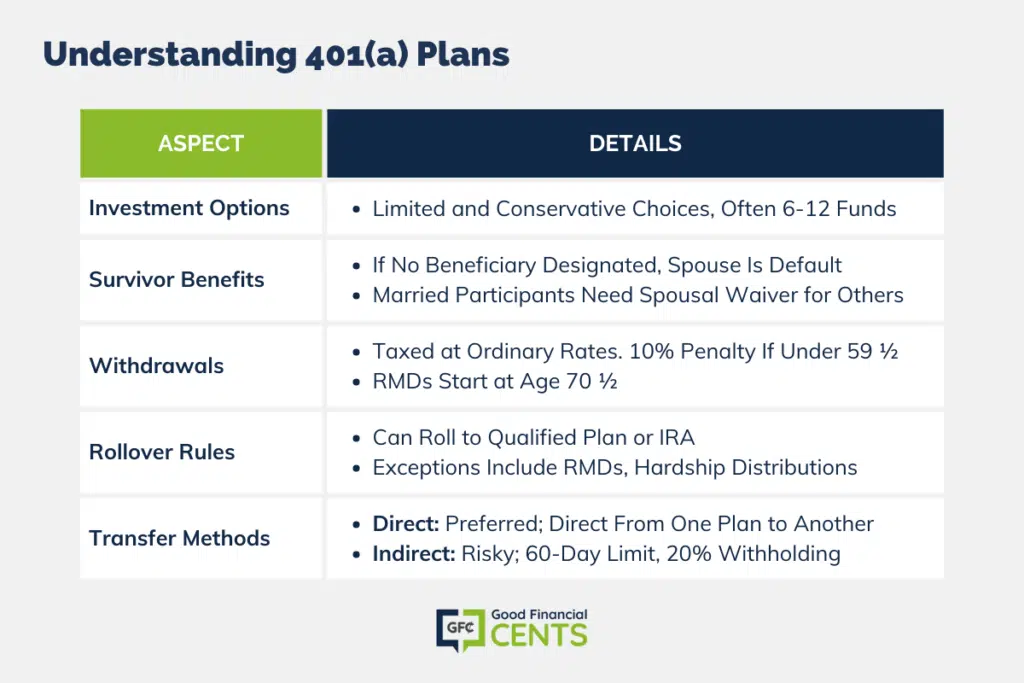There’s a type of retirement plan that’s in the “401 family” that gets little attention.
Maybe that’s because only a relatively small number of employers offer it, even though the number of employees participating in the plan is probably in the millions.
It’s called the 401(a) plan, and while it’s much like the 401(k) plan in most respects, it mostly covers government workers and school and college employees.
So, let’s take some time to delve into 401(a) plans and the rollover rules that apply to them.
What Is a 401(a) Plan?
Table of Contents
A 401(a) plan is a money purchase type retirement plan, typically sponsored by a government agency. Under the plan, the employer must make contributions, but the employee may make contributions. Those contributions are either based on a percentage of income or even a certain dollar amount.
Government agencies that typically use 401(a) plans include:
- The US Government or its agency or instrumentality;
- A state or political subdivision, or its agency or instrumentality; or
- An Indian tribal government or its subdivision, or its agency or instrumentality (participants must substantially perform services essential to governmental functions rather than commercial activities.)
They work much the same as 401(k) plans, though the employer contributions to the plan tend to be more central to the operation of the plan.
Employees may or may not make contributions to their plans, but employers are required to, and those contributions tend to be more generous than what is typically seen with the employer matching contributions on 401(k) plans.
Employee Contributions – Your Consent Is NOT Required!
401(a) plans can provide for either voluntary or mandatory contributions by employees, and this decision is made by the employer as part of the plan. The employer can also determine whether the contributions are made on a pre-tax or after-tax basis.
Once again, employer contributions to a 401(a) plan are mandatory, regardless of whether or not employee contributions are required.
If employee contributions are mandatory, then they will be made on a pre-tax basis (tax-deductible). If they are voluntary, they are usually after-tax. Those contributions can represent up to 25% of the employee’s total compensation. Any contributions to a 401(a) plan made by the employee are immediately vested (owned by the employee).
The employer contributions are typically made using either a fixed dollar amount, a percentage of your compensation, or a match of the employee’s contributions.
Employer contributions are subject to vesting. That means you will have to work for the employer for a certain minimum number of years before you will have full ownership of those contributions.
The vesting schedule can be based either on cliff vesting, which provides for full vesting after a certain number of years, or graded vesting, which provides for incremental vesting over several years.
The maximum dollar amount of contributions to the plan, whether made by the employee or the employer, are capped out at $69,000 in 2024, a $3,000 increase from 2023. Unlike 401(k) plans, 401(a) plans do have a percentage limit, which is 25% of the employee’s compensation. For that reason, the compensation limit for a 401(a) is now $345,000 for plan participants.
Now, notice that $69,000 actually represents only 20% of $345,000. That’s because the calculation requires the dollar amount of the contribution to be calculated based on your income after the maximum contribution is deducted from that compensation.
401(a) Investment Options
In theory, investment options in a 401(a) plan can be just as diverse as they are in any other type of retirement plan. But, since the plans are sponsored by government agencies and educational institutions, the employers tend to have more control over those investment options. They also usually tend to be a lot more conservative in the choices provided.
The plan may work with a single mutual fund family, or it may restrict the number of investment options to something like six to twelve funds.
The funds provided often are also on the conservative side and may provide for a single stock fund, bond fund, stable value fund, government bond fund, and the like.
They may also offer target-date funds, which I’m not really a fan of since they provide more conservative returns and often higher fees.
401(a) plans may be less than desirable in regard to investment options, but that has to be counterbalanced against the higher contributions that are possible with them.
401(a) Plan Survivor Benefits
The survivor benefit rules for 401(a) plans are very similar to those of 401(k) and other plans. While you can designate one or more beneficiaries for the plan in the event of your death, if you fail to do so, your spouse will be the automatically designated survivor.
In fact, if you are married, 401(a) plans typically require your spouse is the beneficiary upon your death, and if it is not, then your spouse must waive his or her right to the proceeds of the plan in writing.
401(a) Plan Withdrawals
Withdrawing funds from a 401(a) plan also works similarly to that of other retirement plans. Any funds withdrawn that represent either pretax contributions or accumulated investment income are taxable at your ordinary income tax rates at the time of withdrawal.
If you make withdrawals prior to turning age 59 ½, you will also have to pay a 10% early withdrawal penalty. That penalty can be waived under certain specific IRS hardship provisions for qualified retirement plans.
Like other retirement plans, a 401(a) plan is also subject to required minimum distributions (RMDs) beginning at age 73. You are not required to make withdrawals from the plan before reaching this age, even if you have reached the age of your actual retirement.
Even if you have not retired, various plans do provide for withdrawals while you are still employed. You may be given the option to withdraw voluntary after-tax contributions at any time or even after you reach a certain age, such as 59 ½, 62, 65, or whatever age is designated as your normal retirement age under the terms of the plan.
401(a) Rollover Rules
401(a) rollover rules are similar to what they are for the rollover of other tax-sheltered retirement plans. You can roll the proceeds of the plan over to the qualified plan of another employer (if the future employer accepts such rollovers) or into a traditional or self-directed IRA account.
The following exceptions apply to rollovers from a 401(a) plan, and they are common exceptions on all retirement plans. You cannot roll over money from the following sources:
- Required minimum distributions
- Hardship distributions
- Amounts distributed to correct excess distributions
- Amounts that represent loans from your plan
- Dividends from your employer-issued securities (not likely with government or non-profit employers)
- Life insurance premiums paid by the pan
Much as is the case with 401(k) plans, you can also either roll the plan balance into a traditional IRA, do a Roth IRA conversion, or a combination of both.
There is a bit of a complication with 401(a) rollovers if the plan includes both pretax and after-tax contributions. If the rollover includes after-tax contributions, this will represent a cost basis in your IRA.
These will be funds you can withdraw free from income tax since the tax was already paid on them during the contribution phase.
Once you take withdrawals from the IRA, the cost basis portion will be nontaxable, but the pretax contribution portion, as well as investment earnings, will be taxable to you as ordinary income.
But as is the case with IRA distributions in general, you cannot withdraw cost basis amounts first in order to avoid taxes. The distribution will be pro-rated across all of your IRAs, and only a percentage of your withdrawal will be tax-free.
It is also possible to transfer the entire balance to a Roth IRA by doing a Roth conversion. This process works the same as it does for a Roth conversion from any other type of tax-sheltered retirement plan.
You will pay ordinary income tax – but not the 10% early withdrawal penalty – on the portion of the plan that represents your pretax contributions and accumulated investment earnings, but not on the after-tax contributions.
Under the indirect transfer, you have the money from the 401(a) plan transferred to you first. You then have 60 days to transfer the funds to the new plan. Otherwise, the funds will be subject to ordinary income tax in the year of distribution, as well as the 10% early withdrawal penalty if you are under age 59 ½.
In the case of 401(a), if you use the indirect method, the employer is required to withhold 20% of the amount of the transfer for federal withholding taxes. This means you will only be able to transfer 80% of the balance. That will result in a taxable distribution of 20% of the plan proceeds unless you have other assets to make a 100% transfer.
Even though the 20% withholding can be recovered when you file your income tax for that year, if you don’t have the funds to make up the difference between the plan balance and the 80% that you received, the end result will be a taxable distribution of the uncovered 20%.
So make sure if you do a rollover or Roth conversion of a 401(a) plan, you do a direct trustee-to-trustee transfer of the funds and avoid that whole potential tax mess.

Where to Rollover
So there are the basics of the 401(a) plan, the 401(k) plans less well-known cousin. If you’re working for a government agency, and particularly in an educational institution, there’s a very good chance this is the plan you are in.
The Bottom Line – 401(a) Retirement Account Rules
401(a) retirement accounts are generally known for being a great way to save for the future, but there’s more than meets the eye when it comes to the rules and regulations associated with them. It’s important to understand what you’re getting yourself into before you decide to invest your hard-earned cash in one of these plans.
From contribution limits to taxation rules and eligibility criteria, it pays off to know the ins and outs of 401(a) retirement accounts. Do your research so you can get the most bang for your buck when it comes time to tap into that 401(a).








My wife worked for a Hospital in Olympia, WA last month working was June 2018. Their 401(a) retirement plan was under Fidelity. Due to military we moved to Texas. She forgot about the plan and we calculating how much retirement and all of the investment she has done so that she can transfer to TSP. Well to our surprise, the money that she invested was taken “forfeiture” in April 2022.
My chronically disabled son is starting a wonderful part-time position (all that he can manage) as a telecommuting center clerk through an NTICentral.org contract with the IRS. The contract is governed by the US DOL’s Service Contract Act regulations which includes a fringe health and welfare benefit ($4.23 per hour) as part of the overall compensations package. This benefit is to be deposited into the National Telecommuting Institute, Inc., Retirement Plan, a tax-deferred 401a plan administered by TIAA-Cref. Participation is mandatory for all NTI-IRS contract employees. The plan notice states that Social Security does not consider this health and welfare benefit taxable wages until withdrawal. Based on income eligibility, my son also receives critical financial subsidy support benefits through Medicaid (MD Dpt. Health and Social Services) and the HUD Housing Choice Voucher Program/HCVP. My question is do Medicaid and HCVP access 401a benefits the same way, eg., not counted as income / assets in eligibility determinations? Medicaid social services and HCVP rent subsidy benefits are crucial to my son’s social services support and housing stability such that their loss sadly may render him financially unable to accept a wonderful job such as this.
I recently left my state job. I was considered a OPS employee (other personal services) which is defined as a temporary worker, although I worked with them for 2 1/2 years, and I’ve known other OPS employees who have been working for 6+ years there. My 401a plan mandated a 7.5% withdrawal from my paycheck in lieu of social security being taken out. There were no employer contributions I know of. I am over 60. I want to withdraw the funds. Is there any way to avoid the 20% federal tax? I appreciate any and all advice, as I’ve read several different articles about this – enough to confuse me.
What if the 401a gains income while leaving the employment, while the account is still in my name, before the 5 years required to be vested.
So, after 5 years does the account become vested account?
Hello. I work for Marton Technologies (govt contractor)and this 401a was involuntarily pushed on us as well. My question is, we get paid every 2 weeks from this company however, they are holding on to our 401a withdrawals for 3 months before depositing them into our retirement accounts? I am trying to research more on this to see if it’s legit for them to hold onto our money for that long. I can see maybe 30 days but 3 months? seems like they are making investments off our money before they give it back to us. Any help with question would greatly be appreciated.
I work for a city municipality government in Florida and nearing retirement, age 66. I am covered by and contribute to a state retirement pension with defined benefits and vested. I am nearing retirement with several thousand dollars in unused vacation accumulated. My employer states that a cash out of the vacation accumulation is not permitted directly to a non-bargaining salaried employee but the employer will, in accordance with the Employee Procedures and Rules Handbook, deposit the distribution into a 401(a). No rules of the 401(a) have been provided by the employer. Is this forced acceptance of a 401(a) permissible by the employer and or IRS rules.
I am age 50 and work for a government agency. My husband is 53 and is disabled from the school system and receives a pension. My retirement plan is a 401(a) and I plan on leaving my job at age 55. Does the “55 rule” apply for 401(a) plans? Can I draw off my 401(a) plan without the 10% penality?
Can I move funds from 401a to 403b while still employed by a company?
You’ll have to check with your employer
I pulled my 401a in my 20s and decided to have 20% withheld for taxes. I received a check for about 113k, for my 10% early withdrawal, how much of it can I offset if possible? I used the money to buy my first home and do
some home remodeling.
Hi Brendan – You’ve got a lot going on there, so my recommendation is to check it out with an accountant. $113,000 could be a large tax bill.
I have a 401a plan at work. If I were to leave my current employer and begin working with an employer who offers a 457b plan, could I roll the 401a balance to the 457b (assuming the new plan accepts such rollovers)? My reason for doing this would be to retire before 59 1/2 and have full access to the money without the 10% penalty.
Hi Mitchell – You should be able to do the rollover as long as the new employer allows it. If not, why not do a roth IRA conversion, and set up a Roth IRA ladder?
You will not have full access, as rollover assets will be tracked separately.
Can an employer refuse to give you your 401a?
Hi Daniel – The can put rules in place governing when the money can be withdrawn. You’ll have to find out what the specific rules are in you plan. They can vary from plan to plan.
I cashed my 401a early do to termination.at the time it was 10000 I am a single mom with 1 dependent .I make 15000 a year will I get any taxes back when I file ?
Hi Jennifer – Only if you had withholding on the cash out, and your actual tax liability is lower than expected.
Yes. I get a nice refund every yr. Because my tax rate is like 12% not the 20% they withhold plus your dependant.
I have a 401(a) plan that has been fully funded by my former employer with pretax contributions. It is a defined benefit pension plan. Since my retirement the balance has continued to earn “interest credits” quarterly. I turned 70 in Dec., 2017 and my participation in the plan must end no later than April 1st of the year following the year I turn 70 1/2. So, by Apr. 1, 2019 for me. The record keeper seems to know very little about the plan rules. Their CSR told me she didn’t think I could take an RMD from the plan without also simultaneously initiating one of the total plan balance distribution options (lump sum, annuity, rollover to another qualified plan or IRA). What I want to do is take an RMD in Dec., 2018, leave the balance in the plan until April 1, 2019, take another RMD and move the remaining balance to an existing direct rollover IRA.
I’m hoping you can tell me if the record keeper is correct or alternately, if I can proceed as I would like with RMDs taken in 2018 and 2019? Thank you!
Hi Ken – The record keeper sounds confused, so you should talk to a manager and get more specific information. Failing that, get a copy of the plan documents and see what they say. Yours is a defined benefit pension so the rules are probably different, and they’ll be specified in the plan documents.
hello
I worked for the electricians union for 10 years and recently transferred to a different union. The administrator is refusing to allow me access to my money even though we were fully vested right away. they also state in your wage that 20% goes into this account. Isn’t there Rules that prevents previous employers from withholding money from you?
Hi Kyle – I’ve heard “stories” of this happening, but never anything official. There may be language in the plan that prevents you from accessing the funds until you reach a certain age, or maybe limited payout options. If you’re concerned, I’d discuss it with a lawyer to see what your options are. But if you do, make sure you bring your plan documents with you, otherwise the lawyer will have nothing to go on.
Hi –
My employer recently switched to a 401a plan and I have some W-2 prep questions..
For tax reporting, I understand 401a contributions, both the employee and employer portions are excluded from box 1 on W-2’s, but should either portion be included in box 3 (social security) and box 5 (medicare wages), we’re in CT by the way? Also should they be reported in box 12 or 14, or are 401a contributions excluded from W-2’s all together? Lastly, with a 401a plan, would we be required to check box 13 (retirement plan) on the W-2’s?
Thanks!
Hi Matt – You shouldn’t be worried about how the 401a will be reported on the W2, that’s your employer’s job. Correct that the 401a will be deducted from wages in Box 1, but not Boxes 3 and 5. As to the other boxes, it’s up to your employer. I’d ask them how they plan to report it.
I am 70 1/2 years old, still working for a hospital and have a 401A retirement. I understand I have to take the RMD, however my question is, am I able to take a partial dispersement of my retirement and rollover the remainder into a qualified IRA? Thank you. SueAnn
Hi SueAnn – You should be able to do the rollover. But you won’t be able to do the rollover with the RMD distribution.
Hello,
I am considering withdrwaing about 39k from a 401(a) at work. My contributions are post tax. Current balance is 66k – so it appears that I can only withdraw what I have contributed and any gains. Question is: what part of the withdrawal will be subject to fed income tax? I know ALL of it will be subject to 10% fed penalty and 2.5% CA state penalty but I cannot imagine having to pay taxes on all amount.
Hi Hector – Since the contributions were post tax, you should pay tax only on the amount of the withdrawal that represents employer contributions and investment income in the plan. They’ll do an allocation. If $22k are your contributions, $22k are employer contributions and $22k is income, 2/3 of any withdrawals will be taxable (the employer contributions and the investment earnings), and subject to the penalty if you’re under age 59.5.
Jeff I started a 401a plan with my employer who has since spun off the subsidiary I was working for . Then they told me since I no longer was their employee they were taking their contribution back. Now they say I can’t have my contribution because of an agreement between the previous company and my current employer. Is this legal ?
Hi Chris – You’ll have to discuss this with a lawyer. Which may be worth pursuing if it’s a substantial amount of money.
Hi Jeff,
My employer said I cannot take a distribution OR roll over my 401A funds prior to normal retirement age. Is this not a Federally Regulated Retirement Plan and can the employer set specific rules for this type of account?
Hi Ginny – The IRS and the US Department of Labor regulate retirement plans, but within those regulations they give a lot of flexibility to the employers/sponsors. Your employer may very well have that restriction, even though it isn’t common any more (it used to be with defined benefit plans). You can ask the administrator for clarification but they probably aren’t doing anything they aren’t permitted to do.
I worked for IL executive branch for 22 months ending in 1998 or so. When I quit I cashed out $1300 think I’d never work for state gvmt again. So I have been working for IL for ~6 years and I can buy the 22 month of pension 401A at about $6000. Question is if I pay via check (no xfers) in 2017 will I then get a tax credit for this year. I pay about 15% fed tax but next year that will drop due to Trumps tax plan. So I might as well get $900 back this year vs $600 back next year. How is the $6000 buy back reported and filed so I get the tax credit for 2017. Are my assumptions correct about a lump sum buybacks and taxes ?
JR
Hi Jonathan – I haven’t studied the changes to 401(a) plans that might come as a result of the new tax plan. The ink is hardly dry on the bill yet. But seriously, please check with a tax preparer. There may be other nuances in your personal tax situation that change the outcome.
Can one do a partial conversion from a 401(a) to an IRA?
You can Frank, as long as your 401k plan employer and administrator allow partial distributions.
I have a 401a plan that was started when I was in the Electricians Union. I have separated from the Union for over 6 years now and I would like to rollover my money to a new 401k where I can have a say on what happens to it. I was told that I could never touch this money until retirement age which is still 21 years away. Is there a way to roll this fund over?
Hi Joel – Check with the plan administrator. It really depends on how the plan is set up, and what is permitted. If you can’t, then you can’t. Employers have tremendous flexibility in setting up and administering these plans.
I continue to remain confused on one point. I have a rollover IRA and I understand I cannot do the “backdoor ROTH” without being subject to the pro-rata rule? But I recently learned I have access to a 401(a) (UC DCP) and can do a ROTH conversion from there with after tax dollars. Am I still going to be subject to the pro-rata(?) rule? I would prefer not to roll my rollover IRA into my 403/457 but I will if it is the best way to get access to ROTH since my income precludes normal ROTH contributions. Any help clarifying this for me would be much appreciated.
Hi Annie – Due to the specific nature of your situation, I think it’s best you discuss this with your tax preparer, or at least with your plan administrator. 401(a) plans are fairly uncommon, and the complications can take unexpected turns.
I have a question that I am getting mixed answers on. I am a financial advisor and I have a client that participated in a 401A plan for many years. She retired this year and took a lump sum from her 401A plan into an IRA, as opposed to taking a monthly benefit amount. She is over 70 1/2 years of age. Is she required to take a required minimum distribution this year and if so, what amount is the benefit calculated on since there was technically not a balance as of 12/31 last year?
Hi Mark – I would think not since the IRA had no balance at year end. But she should need to take the RMD’s in future years, since a traditional IRA is not exempt. This is a good theory question, so I strongly recommend that you get other opinions.
I was vested in a public school 401(a) plan many years ago, but was only with the schools for five years. My pension is less than $50 per month, so I am required, now that I am 70 1/2, to either take a lump sum payout or roll the amount into another IRA. I’ve recently read that a charitable contribution can be made directly from IRAs to the qualifying charity (without being distributed to me first), which has tremendous tax benefits, but my 401(a) phone rep says he has never heard of that plan, so it is not an option for me. Is he correct, or do I need to enlighten him with the details of the law and insist? Or is there some reason why my 401(a) would not qualify for the direct distribution to charity?
Hi Ruth – the phone rep is probably not aware of it because it is unusual. But it’s a tax question, so I would consult an accountant to get a solid answer.
What is your experience with 401A and Windfall Elimination Provision. Why would money in a 401A be subject to the WEP upon full retirement?
Hi Elissa – I don’t have direct experience with this. But from what I understand, if the 401A is the result of a government job in which wages were not subject to FICA taxes, it can reduce the benefit you receive from the SSA as a result of other jobs you’ve held where FICA was withheld. I believe it’s to minimize “double dipping”, but I’m really not sure. It’s an uncommon topic since it doesn’t affect most people.
Elissa,
Jeff is correct as far as my understanding as well. If you talk to SSA, they will tell you specifically that it is to prevent “double dipping” as Jeff described.
I have a 401a plan that I started when I was working in the sheet metal workers union years ago now I’m working a non-union job in the first year working there I tried to transfer my 401 a to my new 401K plan which didn’t happen and didn’t go well either with union representative ! Is there any advice how I can get my money transferred from the union pension fund to my retirement fund now ? Any help would be greatly appreciated thanks Rich K.
@Rich Unfortunately, it’s up to the 401k plan administrator if they allow outside retirement plans to be rolled into your current plan.